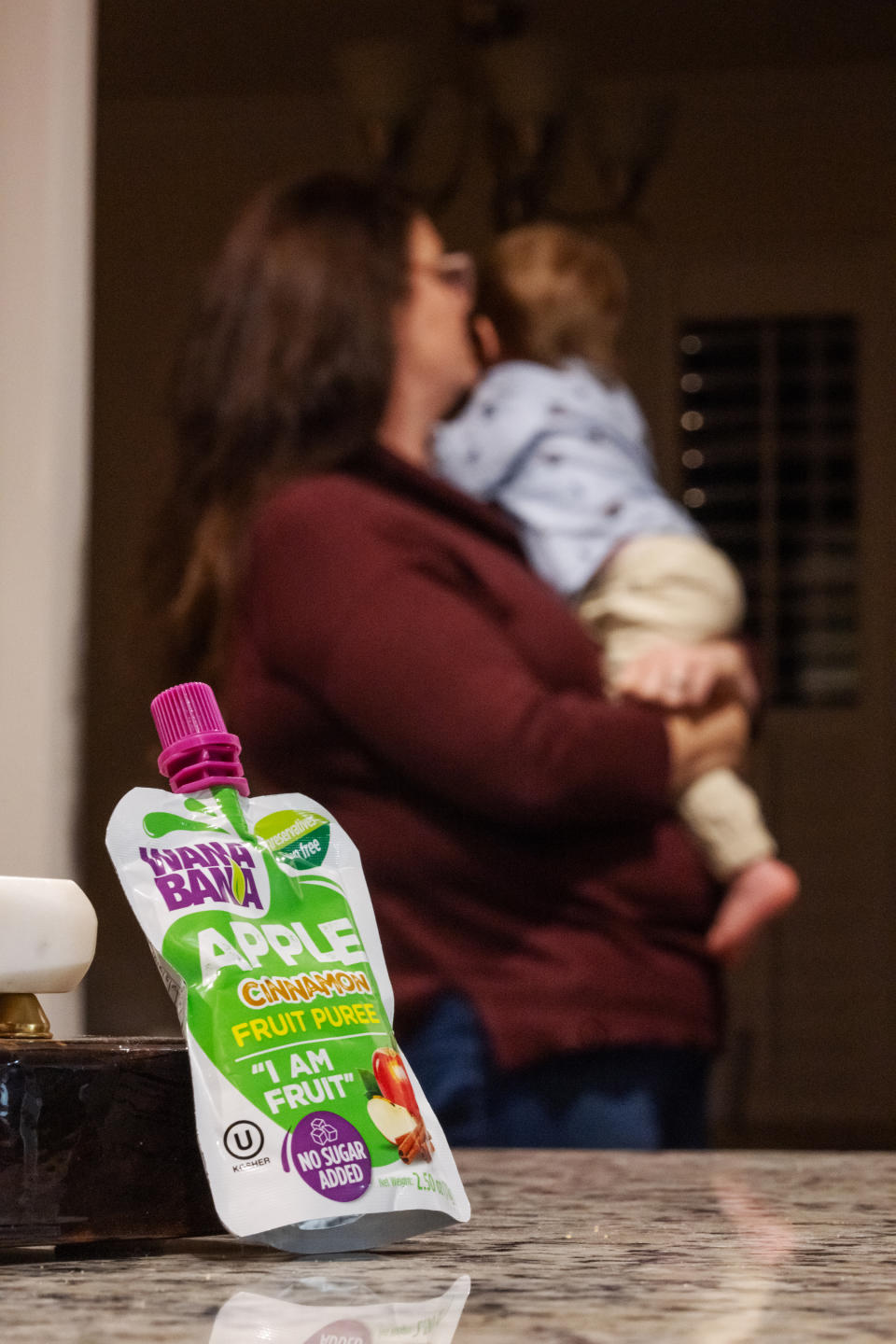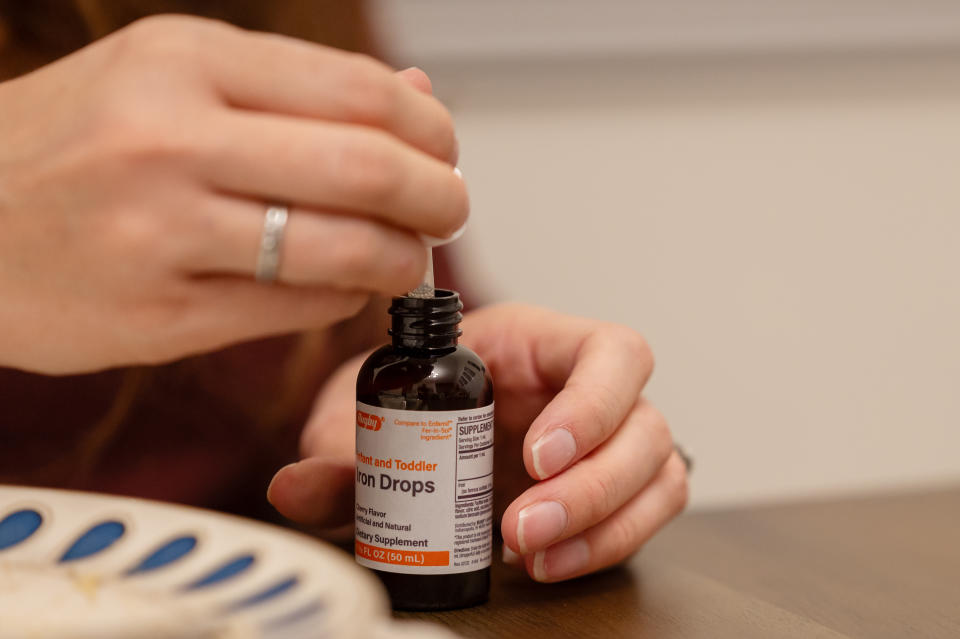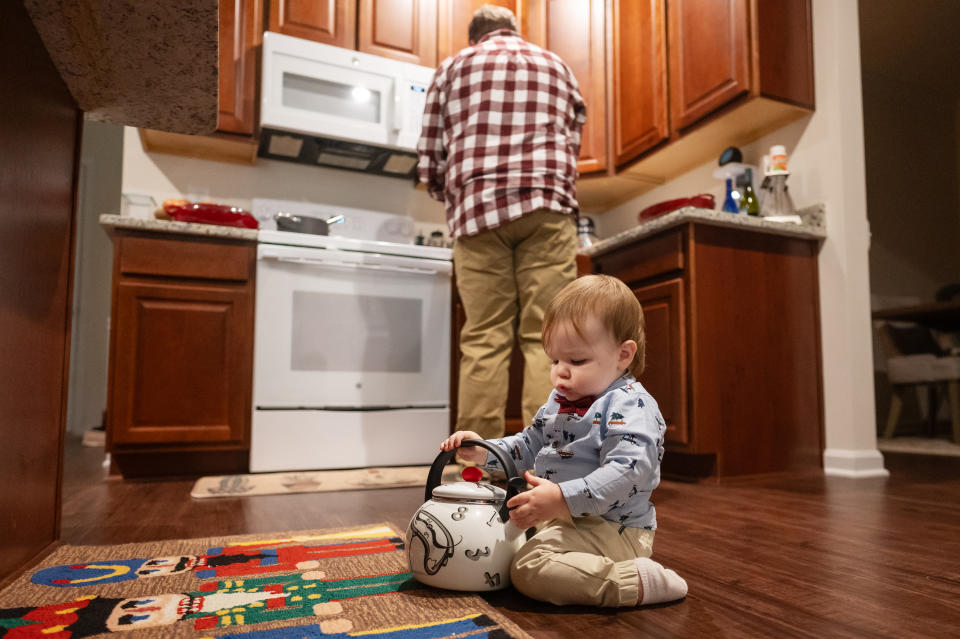A child loved cinnamon applesauce. Then he got lead poisoning.
Sarah and Ricky Callahan thought nothing of it when a doctor tested their son, Rudy, for lead at a checkup, a routine blood test for all young children in Maryland.
But when his levels came back at nearly six times the minimum risk threshold for lead poisoning, they were worried. Surely, there had been a mistake. They had been so careful when it came to their only child, a redhead who loves to build things with blocks and help unload the dishwasher, pulling out all the utensils.
Suddenly, their Maryland home felt like what Ricky Callahan described as a "death trap." Was it the furniture? The carpet? Rudy's toys? Inspectors checked all of that and more - the water, the dishes, his crib - and found nothing suspect.
Months went by, and then a friend at Sarah Callahan's work in whom she had confided about her son's lead poisoning forwarded an article about a Food and Drug Administration recall of the same pureed fruit pouches Rudy had eaten for months. A lightbulb went off.
"As soon as I read the FDA announcement I knew that was the source of my son's lead poisoning," Callahan said in a phone interview from the family's home in Calvert County, about an hour from Washington.
The Food and Drug Administration announced last week that it had received 52 reports of children up to 4 years old potentially exposed to lead in contaminated apple cinnamon fruit puree pouches manufactured by a company in Ecuador and sold under WanaBana, Weis and Schnucks brands. While the FDA won't identify the affected children, the Callahans reported their concerns to the agency after matching a pouch left in their cupboard to the contaminated lot numbers published last month, according to a copy of their complaint.
After weeks without answers, it all added up.
Rudy's lead levels had peaked in a second screening, then dropped as he switched to a whole-foods diet on the advice of experts helping the family work to eliminate potential culprits. A favorite dish is now spinach with cheese and garlic.
The FDA said it is still investigating how the pouches were contaminated, but its "leading hypothesis" is that cinnamon - added to the applesauce Rudy loved - is the likely source. Complaints of suspected exposures have been identified in 25 states, the agency has reported, including three cases in Maryland and one in Virginia.
The other Maryland cases are from the Eastern Shore and the Baltimore area, said Chase Cook, a spokesman for the Maryland Department of Health. He declined to comment on the specifics of any cases.
An analysis of multiple lots of WanaBana apple cinnamon fruit puree detected extremely high concentrations of lead, officials said. Although young children with lead poisoning often show no symptoms, experts say exposure over time can cause lasting neurodevelopmental disabilities.
"There is no reason why in 2023 families are dealing with lead poisoning of their toddlers, of their children, because of a fruit puree that claims to be healthy and safe and free of preservatives," said Nikki Guntner, a Pensacola attorney whose firm, Aylstock, Witkin, Kreis & Overholtz, is working with the Callahans and other parents whose children had elevated lead levels after ingesting contaminated apple puree.
WanaBana, the manufacturer, did not respond to questions Monday but in a previous statement said it has initiated a voluntary recall of the affected batches and is working closely with the FDA to investigate the source of the contamination.
In a statement, the FDA said it is working with state, federal and international partners to investigate the source of the cinnamon and the point of contamination as well as whether additional products are potentially contaminated. The agency is screening incoming shipments of cinnamon from multiple countries for lead contamination and said it has not yet detected elevated lead in imported cinnamon.
"In this instance, the FDA encourages manufacturers that import cinnamon and products that contain cinnamon to be extra vigilant to ensure their products do not contain elevated levels of lead," agency officials said.
While FDA officials said contaminated pouches have been seen on shelves at Dollar Tree stores in multiple states, a Dollar Tree spokeswoman said stores have locked registers to prevent sales of the brand's pouches and instructed stores to remove the product from shelves.
"We are aware of the FDA's recent report and have worked with our store operations teams to ensure the recalled WanaBana Apple Cinnamon Fruit Puree pouches are no longer in our stores and destroyed according to FDA guidelines," the spokeswoman said in a statement.
Research shows exposure to even small amounts of heavy metals such as lead at an early age may increase the risk of several health problems, as well as prospective long-term cognitive consequences that may not show up for years.
Barbara Moore, a pediatric nurse practitioner and director of the lead poisoning program at Mt. Washington Pediatric Hospital in Baltimore, said a child can ingest or inhale lead particles. The material goes into the bloodstream and crosses the blood-brain barrier, which can affect brain development, leading to lower IQ, speech delays and fine motor delays, and can affect growth. Older children may experience attention-deficit disorder, impulsivity problems and learning problems, she said.
A high percentage of environmental investigations show the source has been lead dust or lead paint, Moore said; however, she has noticed more public health alerts for contamination in imported spices.
Parents "may feel a twinge of guilt that they thought they were doing something healthy for their children, giving them a healthy pouch," she said.
The FDA has previously warned about high levels of heavy metals in baby and toddler foods. Heavy metals can leach into fruits and vegetables from soil or water contaminated by pesticides, fertilizers and other sources, or they can be introduced to foods as additives and mineral or vitamin mixes. The focus was prompted by a 2021 congressional report that found many of the products made by the country's largest commercial baby food manufacturers contain significant levels of lead, arsenic, cadmium and mercury.
Although the agency has set maximum allowable levels of metals such as lead in bottled water, it had not previously regulated levels of metals in baby and toddler foods, with the exception of arsenic in rice cereal - an effort that is now underway.
The plans are of little comfort to the Callahans, who began feeding Rudy, now 15 months, the pouches at about 9 months old as he transitioned from breast milk to solid food. They were a regular part of his diet from May through August, and he sometimes consumed as many as six a day, according to Sarah Callahan's complaint to the FDA.
"We took a lot of precautions when picking out his food and . . . were giving him things which we thought were healthy," said Ricky Callahan, 36.
After Rudy's first test on Aug. 22, the state lab identified blood lead levels of 19.8 micrograms per deciliter, his parents said. That's nearly six times the level at which the state identifies children at risk for lead poisoning, 3.5 micrograms per deciliter.
The result triggered the state to call the Callahans and made Rudy eligible for close monitoring. A second draw two weeks later on Sept. 1 showed an even higher level, 22.5 micrograms per deciliter, and a few days later they began the new whole-foods diet, the family said. He had his last pouch on Sept. 6.
Another two weeks passed, and his next test showed little change, 22.4 micrograms per deciliter. But by Sept. 26, his levels were down to 14.3 micrograms per deciliter, an encouraging sign that the source of the lead was declining.
A full month passed before Sarah Callahan read about the applesauce recall on Oct. 30 and scoured their home for pouches, finding one. It matched the contaminated lot numbers reported by WanaBana and the FDA, and she reported the case to the FDA, which prompted the state to call the Callahans again.
Through a process of elimination, Sarah Callahan said, officials she has spoken to believe the pouches are very likely the source after two home inspections, a water test, soil test and blood tests of the parents found nothing, and because the new diet helped and the puree batch numbers matched.
Even with the probable source identified, the Callahans are on edge, waiting to see if Rudy hits milestones at the same pace as other children his age. The Callahans worked with Calvert County Public Schools on an early intervention plan for Rudy, who has speech delays, and a specialist comes to their home every two weeks to track his development.
"I am just concerned about his future," said Sarah Callahan, 39. "I want the best for my son."
Related Content
A child loved cinnamon applesauce. Then he got lead poisoning.
How one rabid kitten triggered intensive effort to contain deadly virus
A lovers' tale of romance, fidelity and the aviary netting keeping them apart








